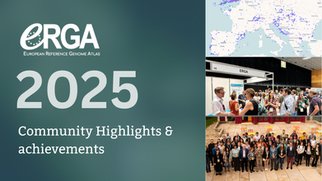top of page

HOME
A GENOME ATLAS
OF EUROPEAN BIODIVERSITY
The European Reference Genome Atlas (ERGA) initiative is a pan-European scientific response to current threats to biodiversity. Reference genomes provide the most complete insight into the genetic basis that forms each species and represent a powerful resource in understanding how biodiversity functions. With approximately one fifth of the ~200,000 European species at risk of extinction, we need to act fast and together to generate high-quality complete genome resources in large scale.
Science needs genomes to understand biodiversity,
biodiversity needs to be understood to be protected.
HIGHLIGHTS
EVENTS
Open to Collaborate

ERGA is committed to the development of new modes of collaboration, engagement, and partnership with Indigenous peoples for the care and stewardship of past and future heritage collections.
Calls
OUR MISSION




1/3




1/3





1/3




1/3
WHAT WE DO
Establishing high-quality reference genomes requires an interdisciplinary workflow


From species to genomes … and beyond.
From species selection to data analysis, the process of creating reference genomes for the entire biodiversity will involve a deep synergy among museums, research institutes, universities, sequencing centres, bioinformatics and computational groups. Citizens will also play an important role supporting the inclusion of all types of species.
WHAT WE AIM FOR

-
Creating and consolidating a collaborative and interdisciplinary network of scientists across Europe and associated countries
-
Connecting relevant infrastructure across Europe following a distributed model that can dynamically increase
-
Propagating guidelines for state-of-the-art genome establishment through training and knowledge transfer
La comunidad ERGA tiene como objetivo optimizar la producción de genomas de referencia mediante el desarrollo y el intercambio de protocolos y flujos de trabajo, brindando acceso a recursos y apoyando el desarrollo de capacidades a través de la transferencia de conocimientos - para mejorar y ampliar el uso de datos genómicos para la protección y restauración de la biodiversidad
OUR PROJECTS
bottom of page











